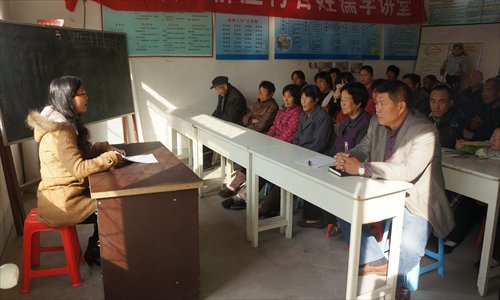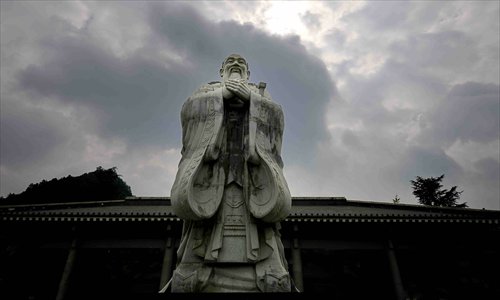Government holds regular Confucian lectures for villagers in Shandong

In Wanliuzhuang village in Qufu, Shandong Province, Wei Futing (left), who was appointed her village's Confucian lecturer, teaches residents about filial piety on a November morning. Photo: Zhang Yu/GT
"The lecture on Confucianism will start soon at the village committee building!" screeched the public loudspeakers in Wanliuzhuang village in the city of Qufu, Shandong Province, on a cold November morning. Over the next 20 minutes, villagers, mostly elderly people and women wearing padded jackets, some cradling babies, started to arrive at the two-story village committee building.
Wei Futing, who teaches Chinese at the village's primary school, was already waiting in the committee's "Confucius Classroom," a 20-square-meter room equipped with a blackboard, a large desk at the front, four rows of white wooden desks and a golden plaque that bears the room's name in Chinese calligraphy hanging on the wall. After today's students - not the first graders she's used to, but her fellow villagers - entered the classroom and sat down, the young woman greeted them saying that "to be frank, Confucius is frighteningly big topic and I don't think I'm capable of teaching you all his great wisdom. I'll try to share with you my personal understanding of his philosophy."
The lecture was a part of "Citizen Confucianism," an ambitious project initiated by the Qufu government this October. The project aims to provide each of Qufu's 405 villages with a lecturer to teach villagers the philosophy of Confucius twice a month.
Qufu, which has a population of around 640,000, is the hometown of Confucius, who is believed to have been born on the nearby Nishan mountain in 551 B.C.
Confucianism fever has been sweeping across the city since President Xi Jinping visited its Confucian institute last November and met with the city's Confucian experts. "The reason why I choose to visit Qufu is to convey one signal: we need to vigorously promote China's traditional culture," he said during his visit. Xi also encouraged the experts to expand their program of moral education and turn the sage's hometown into a model city to show the positive impact Confucianism can have.
Xi's speech during a symposium last month marking the 2,565th anniversary of the birth of Confucius, in which he talked about how China's traditional culture can help improve today's government, was widely seen as another clear signal that Confucianism is close to the heart of the Chinese President.

A statue of Confucius Photo: CFP
The village of brotherly love
Wei, like many other Chinese teachers and young public servants in Qufu's villages, was appointed to be her village's Confucian lecturer. A few weeks ago they were brought together by the Qufu government, which invited Confucian experts from Beijing to give them lessons on how to teach the villagers about Confucianism.
Her picture, phone number and the year's syllabus - the syllabus is shared by all the villages that have participated in the project so far - is printed on a plastic board which hangs at the back of the classroom, allowing villagers to reach her if they have any questions regarding the lectures or Confucianism generally.
The theme of the lecture on that morning, according to the syllabus, was "the principle of filial piety and brotherly love."
Over the course of the 40-minute lecture, Wei started by briefly introducing Confucius' biography and how important filial piety is in Confucian philosophy. The rest of the lecture was a hodgepodge of parables and anecdotes centered around the theme of filial piety including two stories from The Twenty-four Filial Exemplars, a classic text that dates back to the Yuan Dynasty. One of them tells the story of Zhongyou, a disciple of Confucius' who carried heavy bags of rice for dozens of kilometers to feed his parents every day, while he ate only wild vegetables. "Ancient people were this good to their parents," Wei told the villagers. "What should we do to be like them?"
She then recounted an anecdote about a friend of a friend that committed suicide after his wife quarreled with his mother. The message was the importance of maintaining a good relationship with one's in-laws.
Every few minutes, the lesson was interrupted by a cell phone or a crying baby, but most of the villagers silently listened to Wei. No one asked any questions.
"This is the third time I have come to hear one of the lectures. The stories about filial piety are very helpful when I want to educate my kids," Chen Shujie, an accountant that lives in the village, told the Global Times. Chen added that many of the village's young men have moved away and are now working in big cities, and that the lectures about filial piety may help local women and their in-laws get on well with each other.
Wei told the Global Times after the lecture that she tries "to infuse stories into the lecture to make it more fun, since most villagers can't understand original Confucian texts in classical Chinese."
Wanliuzhuang's village head Zhai Fudong was part of the audience watching the lecture. Zhai said that the lectures have had a positive effect on the village. "The villagers now treat their parents better. Neighborhood relationships have also improved."
"Of course, the results of the lectures are gradual. It's impossible to see immediate results," he added.
In Mazhuang village, villagers who attended the Confucius lecture were given a free thermos. "Sometimes we give out these small gifts to attract villagers to attend the lecture," Xu Xuefeng, a public servant working for the government of Fangshan township, which oversees Mazhuang village, told the Global Times.
Citywide fever
"Citizen Confucianism" is just one manifestation of the passion for Confucianism in Qufu. Walking through the city, one sees Confucianism wherever one looks.
In addition to the lectures, some villages are using loudspeakers to broadcast classic Confucian stories and texts to their residents, Xu said.
On a bulletin board in Qianjiacun village, the village committee has listed the names of villagers who have performed the most "good deeds and righteous acts" and the names of people who are appropriately filial to their parents. Statistics showing how much money, oil and rice each elderly person in the village receives from their offspring are also displayed on the bulletin board.
Across the city, a month-long festival to celebrate "Citizen Confucianism" is in full swing. Every day, huge crowds of people, on trips organized by their villages, neighborhoods, companies and schools, are dropped off at the Temple of Confucius to worship the sage.
Even taxi drivers are reading classic Confucian texts. "The government sends us free readers on Confucianism. I find that they are helpful in my daily life," a taxi driver, surnamed Liu, told the Global Times.
Confucius institutes and advertisements for "Confucianism camps" can be seen everywhere in the city. One of the most famous institutes in Qufu is the Confucius Etiquette Culture School, which instructs children, corporations and the government in the tenets of the ancient moral philosophy. Last year, its headmaster, Jin Hui, was among the experts that met with President Xi Jinping.
A 12-meter tall bronze statue of Confucius, erected in 2012, stands on the institute's campus. Lan Ping, a teacher at the school, said that they recite Confucian classics every morning while they worship the statue.
Yue Yaofang, vice director of Qufu's publicity department, is a staunch supporter of the initiative to spread Confucianism in Confucius' hometown.
"In moving from a planned economy to a market economy our villages have gone through many changes, including the fact that more and more couples are now separated, which is a destabilizing factor in society. This is why people need to be educated in traditional ethics, including Confucianism," he told the Global Times.
"These efforts have proved to be beneficial to the governing of the city. There's an old saying that goes, harmony brings wealth. Only when people get along well in a family can it be prosperous," Yue said. He added that Qufu's scientific and economic development has been improving in the past two years and winning regional awards, partially thanks to its promotion of Confucianism.
This top-down spread of Confucianism does have its critics however. "It's absurd," Yuan Weishi, professor of philosophy at Guangdong's Sun Yat-sen University, told the Global Times.
Yuan said the Qufu government, through these official lectures, has failed to recognize the boundaries between the role of the government and the role of civil society. "A modern government should only do what is its duty, upholding the rule of law. It should not favor one ideology or culture. What will the Christians think? And Muslims?"
"If these lectures truly work, it only shows how poor our country's education system is. Respect for parents and for others, aren't these the most basic things that children should learn during their compulsory education?"
Yuan said Confucianism, as it advocates a paternalistic hierarchy, is inconsistent with modern government. "Confucianism has nothing to do with democracy, or with the rule of law," he said, although some elements of Confucius' teachings, such as his political wisdom and the practice of self-cultivation, might still be helpful.